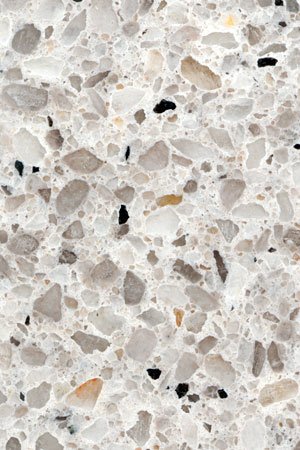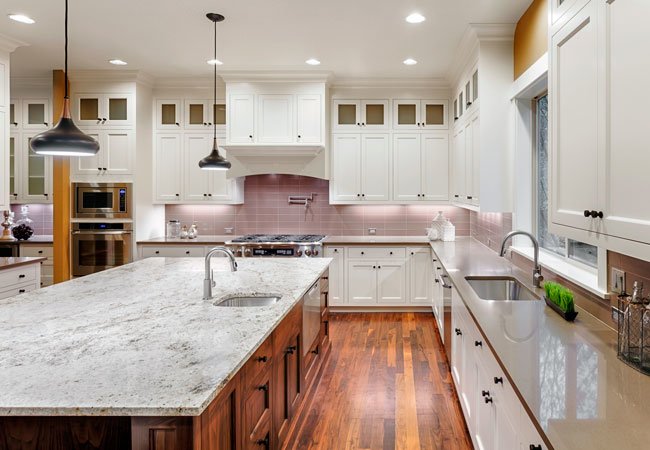We may earn revenue from the products available on this page and participate in affiliate programs. Learn More ›
Quartz. Quartzite. The names sound alike. But although both of these popular countertop materials are derived from the same mineral, and both achieve a similar aesthetic when installed, they are not the same.
Quartzite is formed when quartz-rich sandstone is exposed to high heat and pressure over time as a result of natural processes. It’s found all over the world and in a variety of patterns and colors. Engineered quartz, in contrast, is factory-produced by combining quartz with resins, binding agents, and occasionally pigments.
Thanks to the latest leaps in the aesthetics of man-made stone, today’s quartz genuinely reflects nature’s splendor, but with an important upgrade: unlike natural quartzite, which must be sealed on a regular basis (twice a year, according to some experts), quartz does not require any sealing in order to resist stains, making it a very popular compromise. In fact, resin binders render quartz countertops nonporous, making the material impervious to mold, mildew, and stain- and odor-causing bacteria.
Whether yours are quartzite or quartz, you can maintain the surface using the same techniques.
Quartz Countertop Care
- Clean fresh spills with dish soap and a soft cloth, e.g., microfiber.
- Use glass or surface cleaner, along with a nonabrasive sponge, to remove stains.
ROUTINE CLEANING
Though quartz will resist permanent staining when exposed to liquids like wine, vinegar, tea, lemon juice, and soda, or fruits and vegetables, it’s important to wipe up spills immediately—before they have a chance to dry. Take care of fresh messes with mild dishwashing detergent and a soft cloth.
For dried spills or heavy stains, your best bet is a glass or surface cleaner, a nonabrasive sponge (sponges designed for nonstick pans are safe and effective), and a little elbow grease. Keep a plastic putty knife handy to gently scrape off gum, food, nail polish, paint, or other messes that harden as they dry.

Should you find yourself confronting a particularly sticky situation, your stain-busting might require a couple of extra tools.
- Removing cooking grease. If dinner was great but the counter took a beating, use a degreasing product, such as Krud Kutter or Easy-Off. Kitchen degreasers loosen and remove the grease from the quartz countertop surface. Follow the degreaser manufacturer’s instructions for use.
- Removing permanent marker. Permanent markers are supposed to be, well… permanent. When the kids get creative, make sure your counters are protected from their artistry by first putting down placemats or kraft paper, so the only thing they leave behind is a happy memory. Should you find an ink or permanent marker stain after craft time, moisten a cloth with Goo Gone (available on Amazon) or a comparable product, and rub it into the stain. Rinse thoroughly with warm water to remove any cleanser residue.
DEEP CLEANING
Daily wiping and attention to spills and messes will satisfy your countertop’s basic daily maintenance requirements. But experts also recommend an overall deeper general cleaning at regular intervals. For best results, spray a generous amount of a nonabrasive surface cleaner over your countertop and let it sit for 10 minutes. Wipe away with a non-scratch sponge.
WHAT NOT TO DO
When it comes to caring for quartz countertops, the dos are easy and straightforward. Preserving your counter’s integrity and appeal is more about adhering to the list of don’ts.
- Abrasives and acid or alkaline cleaners. For starters, never use abrasive cleansers and avoid scouring pads, which can dull the surface. Fortunately, soapy water will usually do the trick. If you need a gentle cleanser with a little more oomph to remove surface stains, make sure it is specifically designed for use on quartz.Beware, too, of harsh cleaning solutions at both ends of the pH spectrum. Culprits include products from nail polish remover and turpentine to drain cleaner and dishwasher rinsing agents. Whether highly acidic or highly alkaline, those chemicals can disintegrate the bonds between quartz and resin. Quartz will tolerate casual exposure to milder alkaline solutions, such as diluted bleach, but high-pH substances, such as oven cleaners and concentrated bleach, will damage the surface. If any of the substances mentioned above come into contact with your quartz countertop, rinse the exposed surface immediately and thoroughly with water.
- Extreme heat. Trivets and hot pads are your quartz countertop’s best friends. Though the material is heat- and scorch-resistant, the resin used in manufacturing quartz countertops is a plastic and therefore prone to melting in heat above 300 degrees Fahrenheit. A sudden change in temperature or prolonged exposure to heat from a pan left on the countertop may even cause the quartz to crack. To be safe, always use a trivet or hot pad.
- Slicing or dicing without a cutting board. Quartz is a hard surface, but not hard enough to withstand the effects of sharp objects like knives. So, slice and dice to your heart’s content, but make sure to do it on a cutting board to avoid ugly scratches on your quartz countertops.
- The elements. Quartz is not the right choice for an outdoor kitchen. If you install it outdoors, you do so at your own risk, as all manufacturer warranties cover indoor use only. Day after day in direct sunlight will fade colors and lead to warping or splitting.
Combining the best of authenticity and ingenuity, quartz is truly the rock of all ages. Be kind to your quartz countertops with regular attention and cleaning, and they will give you a lifetime of pleasure!


